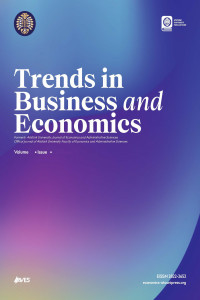Cuçe öğretisi doğrultusunda Kuzey Kore nükleer programı
Kuzey Kore, Nükleer, Kore Savaşı, Cuçe, ABD
North Korean nuclear programme in the ligth of juche idea
Kuzey Kore, Nükleer, Kore Savaşı, Cuçe, ABD,
___
- Akçadağ Alagöz, E. (2019), Stratejik Kültür Perspektifinden Kuzey Kore’nin Nükleer Programı, Uluslararası İlişkiler 16, S. 61, 111–26.
- Armaoğlu, F. (2005), 20. Yüzyıl Siyasî Tarihi, Cilt 1-2. İstanbul: Alkım Yayınevi.
- Armstrong, C. K. (2005), ‘Fraternal Socialism’: The International Reconstruction of North Korea, 1953-62, Cold War History 5, no. 2, 161–87.
- Balcı, A. (2020), Realizm, Uluslararası İlişkilere Giriş Tarih, Teori, Kavram ve Konular, ed. Şaban Kardaş, Ali Balcı. 10.bs. İstanbul: Küre Yayınları.
- BBC, Kuzey Kore: İlk hidrojen bombası denemesini başarıyla gerçekleştirdik, 06.01.2016, https://www.bbc.com/turkce/haberler/2016/01/160106_kuzey_kore_hidrojen_bombasi [Erişim Tarihi: 14.06.2021].
- BBC, Kuzey Kore lideri Kim ve Trump, tarihi zirve için Singapur'da, 10.06.2018, https://www.bbc.com/turkce/haberler-dunya-44429566 [Erişim Tarihi: 14.06.2021].
- BBC, Trump ve Kim'in Vietnam zirvesi hakkında bilinmesi gerekenler, 26.02.2019, https://www.bbc.com/turkce/haberler-dunya-47373495 [Erişim Tarihi: 14.06.2021].
- Bermudez, J.S. (1989), North Korea—Set to join the ‘Nuclear Club. Jane’s Defense Weekly, September 23, 594-597.
- Euronews, Kuzey Kore'den iki kısa menzilli balistik füze denemesi, 24.03.2021, https://tr.euronews.com/2021/03/24/kuzey-kore-den-iki-k-sa-menzilli-balistik-fuze-denemesi [Erişim Tarihi: 14.06.2021].
- Habib, B., O’neil, A. (2009), North Korea’s Emergence as a Nuclear Weapons State and the End of the Disarmament Paradigm, Global Change, Peace and Security 21, no. 3, 377–87.
- Habib, B. (2011), North Korea’s Nuclear Weapons Programme and the Maintenance of the Songun System, Pacific Review 24, no. 1, 43–64. https://www.presidency.ucsb.edu/documents/the-presidents-news-conference-583 The President's News Conference [Accessed: 14.06.2021]
- KBS World, Timeline: North Korea's Nuclear and Missile Programs, http://world.kbs.co.kr/special/northkorea/contents/history/nucleus_history.htm?lang=e [Accessed: 10.06.2021]
- Huntley, Wade L. (2006), Rebels without a Cause: North Korea, Iran and the NPT, International Affairs 82, no. 4, 723–42.
- Howell, E. (2020), The Juche H-Bomb? North Korea, Nuclear Weapons and Regime-State Survival, International Affairs 96, no. 4, 1051–68.
- Gordy, K., Lee, J. S. (2009), Rogue Specters: Cuba and North Korea at the Limits of US Hegemony, Alternatives 34, no. 3, 229–48.
- Kakışım, C. (2017), Kuzey Kore’nin Resmî İdeolojisi Olarak Cuçe Öğretisi ve Kuzey Kore Dış Politikasına Etkileri, Uluslararası İlişkiler 14, no. 56, 73–89.
- Karabulut, A. (2019), Güç Olgusunda Nükleer Silahlanma: Kazakistan – Kuzey Kore Örneği, Doktora Tezi: İGÜ Sosyal Bilimler Enstitüsü.
- Kennedy, P. (2008), Büyük Güçlerin Yükseliş ve Çöküşleri . çev. Birtane Karanakçı, Ankara: Türkiye İş Bankası Kültür Yayınları.
- Khaliun, A. (2007), Kuzey Kore’nin Nükleer Politikası, Yüksek Lisans Tezi: Ankara Üniversitesi Sosyal Bilimler Enstitüsü.
- Kibaroğlu, M. (2004), Kuzey Kore’nin Nükleer Silah Programı: Sebepler ve Sonuçlar, Uluslararası İlişkiler 1, no. 1, 154–72.
- Kibaroğlu, M. (2005), Enerji Mi? Silah Mı? Nükleer’in İki Yüzü Avrasya Dosyası Nükleer Özel Sayısı, 1–12.
- Kim, S. K. (2017), Juche (Self-Reliance) in North Korea, The Wiley-Blackwell Encyclopedia of Social Theory, 1–3.
- Koçtaş, G. (2018), Nuclear Will Of North Korea: An Exceptional Case Of Deterrence Strategy, Yüksek Lisans Tezi: Avrupa Birliği ve Uluslararası İlişkiler Enstitüsü.
- Mansourov, A. Y. (1995), The Origins, Evolution, and Current Politics of the North Korean Nuclear Program, The Nonproliferation Review 2, no. 3, 25–38.
- Mansourov, A. Y. (2004), North Korea’s Road to the Atomic Bomb, International Journal of Korean Unification Studies 13, no. 1, 21–58.
- Milliyet, BM Kuzey Kore'ye yaptırımları ağırlaştırdı! Trump'tan ilk yorum: Takdir ettim, 06.08.2017, https://www.milliyet.com.tr/dunya/bm-kuzey-koreye-yaptirimlari-agirlastirdi-trumptan-ilk-yorum-takdir-ettim-2497215 [Erişim Tarihi: 14.06.2021].
- Moore, G. (2008), America’s Failed North Korea Nuclear Policy: A New Approach, Asian Perspective 32, no. 4, 9–27.
- Ree, E. V. (1989), The Limits of Juche: North Korea’s Dependence on Soviet Industrial Aid, 1953-76, Journal of Communist Studies 5, no. 1, 50–73.
- Rothman, T. (2007), A State’s Choice: Nuclear Policy in a Changing World between Libya and North Korea, Defense and Security Analysis 23, no. 3, 297–313.
- Sander, O. (1989), Siyasi Tarih 1918-1994 . 24. bs. Ankara: İmge Kitabevi Yayınları.
- Shuja, S. (2007), America, North Korea and Iran, Contemporary Review, Vol. 289 Issue 1687, 432-441.
- Sputnik, Trump: Kuzey Kore'ye karşı nükleer silah kullanmaya hazırız, 04.09.2017, https://tr.sputniknews.com/abd/201709041029981422-trump-kuzey-kore-nukleer-silah/ [Erişim Tarihi: 14.06.2021].
- Harrison, S. S. (2005), Did North Korea Cheat?, Foreign Affairs 84, no. 1, 99–110.
- Yavaş, A. (2013), Kore Sorunu ve Uzak Doğu’da İstikrar Arayışı: Altılı Görüşmeler, Asya’da Güvenlik Sorunları ve Yansımaları, ed. R. Kutay Karaca. İstanbul, BİLGESAM Yayınları, 197-224.
- Ying, F. (2017), The Korean Nuclear Issue: Past, Present, and Future, China Center at Brookings Institution.
- Wood, A. F., David P. T. (2016), ‘The Only Dominator and Remaker of the World’:
, , and the Rhetoric of North Korean Juche, Western Journal of Communication 80, no. 4, 502–18.
- Başlangıç: 1977
- Yayıncı: Atatürk Üniversitesi
Sektörel ayrışma ve emek verimliliği
Aşil sendromunun makyavelist davranış eğilimi üzerine etkisi: Bir alan araştırması
Sevda DEMİR, Hilal KUŞCU KARATEPE, Ulviye ÖZCAN YÜCE
Örtülü sermaye uygulamasında ortaya çıkabilecek kur farklarının değerlendirilmesi
Muhammet DAŞTAN, Kerem KARABULUT
İlayda TEKİN, Nazlı Ayşe AYYILDIZ ÜNNÜ
Banka çalışanlarının işe bağlılığını etkileyen faktörlerin belirlenmesine yönelik bir araştırma
A. Aslan ŞENDOĞDU, İlkay ALTINDAĞ
Türkiye’de geçici ve kalıcı işlerde çalışanlar arasındaki ücret farklılıkları
Selçuk GEMİCİOĞLU, Hasan ŞAHİN
